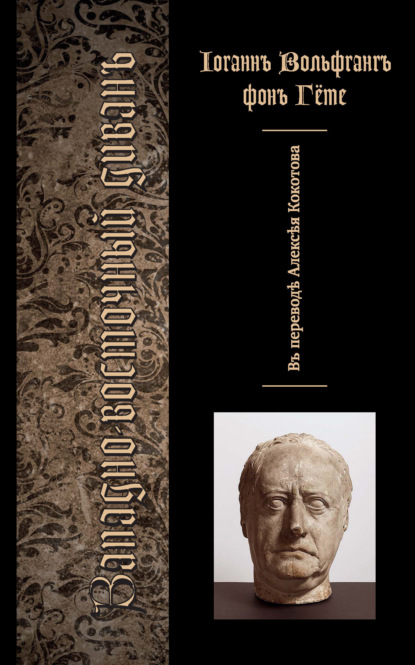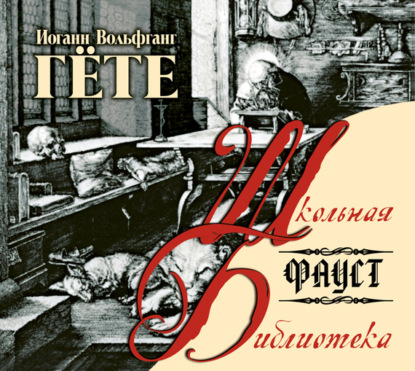 ТекстПолная версия
ТекстПолная версия Полная версия
- О книге
- Читать
Indeed, the previous merry life of our three adventurers was interfered with by this extension of their society, in more ways than one. Melina had taken up his quarters in the inn where Philina staid, and he very soon began a system of cheapening and higgling. He would have better lodging, more sumptuous diet, and readier attendance, for a smaller charge. In a short while, the landlord and waiter showed very rueful looks; for whereas the others, to get pleasantly along, had expressed no discontent with any thing, and paid instantly, that they might avoid thinking longer of payment, Melina now insisted on regulating every meal, and investigating its contents beforehand, – a species of service for which Philina named him, without scruple, a ruminating animal.
Yet more did the merry girl hate Melina's wife. Frau Melina was a young woman not without culture, but wofully defective in soul and spirit. She could declaim not badly, and kept declaiming constantly; but it was easy to observe that her performances were little more than recitations of words. She labored a few detached passages, but never could express the feeling of the whole. Withal, however, she was seldom disagreeable to any one, especially to men. On the contrary, people who enjoyed her acquaintance commonly ascribed to her a fine understanding; for she was what might be called a kind of spiritual chameleon, or taker-on. Any friend whose favor she had need of she could flatter with peculiar adroitness, could give in to his ideas so long as she could understand them, and, when they went beyond her own horizon, could hail with ecstasy such new and brilliant visions. She understood well when to speak and when to keep silence; and, though her disposition was not spiteful, she could spy out with great expertness where another's weak side lay.
CHAPTER VI
Melina, in the mean time, had been making strict inquiry about the wrecks of the late theatrical establishment. The wardrobe, as well as decorations, had been pawned with some traders; and a notary had been empowered, under certain conditions, to dispose of them by sale, should purchasers occur. Melina wished to see this ware, and he took Wilhelm with him. No sooner was the room opened, than our friend felt towards its contents a kind of inclination, which he would not confess to himself. Sad as was the state of the blotched and tarnished decorations; little showy as the Turkish and pagan garments, the old farce-coats for men and women, the cowls for enchanters, priests, and Jews, might be, – he was not able to exclude the feeling, that the happiest moments of his life had been spent in a similar magazine of frippery. Could Melina have seen into his heart, he would have urged him more pressingly to lay out a sum of money in liberating these scattered fragments, in furbishing them up, and again combining them into a beautiful whole. "What a happy man could I be," cried Melina, "had I but two hundred crowns, to get into my hands, for a beginning, these fundamental necessaries of a theatre! How soon should I get up a little playhouse, that would draw contributions from the town and neighborhood, and maintain us all!" Wilhelm was silent. They left these treasures of the stage to be again locked up, and both went away in a reflective mood.
Thenceforth Melina talked of nothing else but projects and plans for setting up a theatre, and gaining profit by it. He tried to interest Philina and Laertes in his schemes; and proposals were made to Wilhelm about advancing money, and taking them as his security. On this occasion, Wilhelm first clearly perceived that he was lingering too long here: he excused himself, and set about making preparations for departure.
In the mean time, Mignon's form, and manner of existence, were growing more attractive to him every day. In her whole system of proceedings there was something very singular. She never walked up or down the stairs, but jumped. She would spring along by the railing, and before you were aware would be sitting quietly above upon the landing. Wilhelm had observed, also, that she had a different sort of salutation for each individual. For himself, it had of late been with her arms crossed upon her breast. Often for the whole day she was mute. At times she answered various questions more freely, yet always strangely: so that you could not determine whether it was caused by shrewd sense, or ignorance of the language; for she spoke in broken German interlaced with French and Italian. In Wilhelm's service she was indefatigable, and up before the sun. On the other hand, she vanished early in the evening, went to sleep in a little room upon the bare floor, and could not by any means be induced to take a bed or even a paillasse. He often found her washing herself. Her clothes, too, were kept scrupulously clean; though nearly all about her was quilted two or three plies thick. Wilhelm was moreover told, that she went every morning early to hear mass. He followed her on one occasion, and saw her kneeling down with a rosary in a corner of the church, and praying devoutly. She did not observe him; and he returned home, forming many a conjecture about this appearance, yet unable to arrive at any probable conclusion.
A new application from Melina for a sum of money to redeem the often-mentioned stage apparatus caused Wilhelm to think more seriously than ever about setting off. He proposed writing to his people, who for a long time had heard no tidings of him, by the very earliest post. He accordingly commenced a letter to Werner, and had advanced a considerable way with the history of his adventures, in recounting which he had more than once unintentionally swerved a little from the truth, when, to his vexation and surprise, he observed, upon the back of his sheet, some verses which he had been copying from his album for Madam Melina. Out of humor at this mistake, he tore the paper in pieces, and put off repeating his confession till the next post-day.
CHAPTER VII
Our party was now again collected; and Philina, who always kept a sharp lookout on every horse or carriage that passed by, exclaimed with great eagerness, "Our Pedant! Here comes our dearest Pedant! Who the deuce is it he has with him?" Speaking thus, she beckoned at the window; and the vehicle drew up.
A woful-looking genius, whom by his shabby coat of grayish brown, and his ill-conditioned lower garments, you must have taken for some unprosperous preceptor, of the sort that moulder in our universities, now descended from the carriage, and, taking off his hat to salute Philina, discovered an ill-powdered, but yet very stiff, periwig; while Philina threw a hundred kisses of the hand towards him.
As Philina's chief enjoyment lay in loving one class of men, and being loved by them; so there was a second and hardly inferior satisfaction, wherewith she entertained herself as frequently as possible; and this consisted in hoodwinking and passing jokes upon the other class, whom at such moments she happened not to love, – all which she could accomplish in a very sprightly style.
Amid the flourish which she made in receiving this old friend, no attention was bestowed upon the rest who followed him. Yet among the party were an oldish man and two young girls, whom Wilhelm thought he knew. Accordingly it turned out, that he had often seen them all, some years ago, in a company then playing in his native town. The daughters had grown since that period: the old man was a little altered. He commonly enacted those good-hearted, boisterous old gentlemen, whom the German theatre is never without, and whom, in common life, one also frequently enough falls in with. For as it is the character of our countrymen to do good, and cause it, without pomp or circumstance; so they seldom consider that there is likewise a mode of doing what is right with grace and dignity: more frequently, indeed, they yield to the spirit of contradiction, and fall into the error of deforming their dearest virtue by a surly mode of putting it in practice.
Such parts our actor could play very well; and he played them so often and exclusively, that he had himself taken up the same turn of proceeding in his ordinary life.
On recognizing him, Wilhelm was seized with a strong commotion; for he recollected how often he had seen this man on the stage with his beloved Mariana: he still heard him scolding, still heard the small, soothing voice, with which in many characters she had to meet his rugged temper.
The first anxious question put to the strangers, – Whether they had heard of any situation in their travels? – was answered, alas, with No! and, to complete the information, it was further added, that all the companies they had fallen in with were not only supplied with actors, but many of them were afraid lest, on account of the approaching war, they should be forced to separate. Old Boisterous, with his daughters, moved by spleen and love of change, had given up an advantageous engagement: then, meeting with the Pedant by the way, they had hired a carriage to come hither; where, as they found, good counsel was still dear, needful to have, and difficult to get.
The time while the rest were talking very keenly of their circumstances, Wilhelm spent in thought. He longed to speak in private with the old man: he wished and feared to hear of Mariana, and felt the greatest disquietude.
The pretty looks of the stranger damsels could not call him from his dream; but a war of words, which now arose, awakened his attention. It was Friedrich, the fair-haired boy who used to attend Philina, stubbornly refusing, on this occasion, to cover the table and bring up dinner. "I engaged to serve you," he cried, "but not to wait on everybody." They fell into a hot contest. Philina insisted that he should do his duty; and, as he obstinately refused, she told him plainly he might go about his business.
"You think, perhaps, I cannot leave you!" cried he sturdily, then went to pack up his bundle, and soon hastily quitted the house.
"Go, Mignon," said Philina, "and get us what we want; tell the waiter, and help him to attend us."
Mignon came before Wilhelm, and asked in her laconic way, "Shall I? May I?" To which Wilhelm answered, "Do all the lady bids thee, child."
She accordingly took charge of every thing, and waited on the guests the whole evening, with the utmost carefulness. After dinner, Wilhelm proposed to have a walk with the old man alone. Succeeding in this, after many questions about his late wanderings, the conversation turned upon the former company; and Wilhelm hazarded a question touching Mariana.
"Do not speak to me of that despicable creature!" cried the old man: "I have sworn to think of her no more." Terrified at this speech, Wilhelm felt still more embarrassed, as the old man proceeded to vituperate her fickleness and wantonness. Most gladly would our friend have broken off the conversation, but now it was impossible: he was obliged to undergo the whole tumultuous effusions of this strange old gentleman.
"I am ashamed," continued he, "that I felt such a friendship for her. Yet, had you known the girl better, you would excuse me. She was so pretty, so natural and good, so pleasing, in every sense so tolerable, I could never have supposed that ingratitude and impudence were to prove the chief features of her character."
Wilhelm had nerved himself to hear the worst of her; when all at once he observed, with astonishment, that the old man's tones grew milder, his voice faltered, and he took out his handkerchief to dry the tears, which at last began to trickle down his cheeks.
"What is the matter with you?" cried Wilhelm. "What is it that suddenly so changes the current of your feelings? Conceal it not from me. I take a deeper interest in the fate of this girl than you suppose. Only tell me all."
"I have not much to say," replied the old man, again taking up his earnest, angry tone. "I have suffered more from her than I shall ever forgive. She had always a kind of trust in me. I loved her as my own daughter; indeed, while my wife lived, I had formed a resolution to take the creature to my own house, and save her from the hands of that old crone, from whose guidance I boded no good. But my wife died, and the project went to nothing.
"About the end of our stay in your native town, – it is not quite three years ago, – I noticed a visible sadness about her. I questioned her, but she evaded me. At last we set out on our journey. She travelled in the same coach with me; and I soon observed, what she herself did not long deny, that she was with child, and suffering the greatest terror lest our manager might turn her off. In fact, in a short while he did make the discovery; immediately threw up her contract, which at any rate was only for six weeks; paid off her arrears; and, in spite of all entreaties, left her behind, in the miserable inn of a little village.
"Devil take all wanton jilts!" cried the old man, with a splenetic tone, "and especially this one, that has spoiled me so many hours of my life! Why should I keep talking how I myself took charge of her, what I did for her, what I spent on her, how in absence I provided for her? I would rather throw my purse into the ditch, and spend my time in nursing mangy whelps, than ever more bestow the smallest care on such a thing. Pshaw! At first I got letters of thanks, notice of places she was staying at; and, finally, no word at all, – not even an acknowledgment for the money I had sent to pay the expenses of her lying-in. Oh! the treachery and the fickleness of women are rightly matched, to get a comfortable living for themselves, and to give an honest fellow many heavy hours."
CHAPTER VIII
Wilhelm's feelings, on returning home after this conversation, may be easily conceived. All his old wounds had been torn up afresh, and the sentiment that Mariana was not wholly unworthy of his love had again been brought to life. The interest the old man had shown about her fate, the praises he gave her against his will, displayed her again in all her attractiveness. Nay, even the bitter accusations brought against her contained nothing that could lower her in Wilhelm's estimation; for he, as well as she, was guilty in all her aberrations. Nor did even her final silence seem greatly blamable: it rather inspired him with mournful thoughts. He saw her as a frail, ill-succored mother, wandering helplessly about the world, – wandering, perhaps, with his own child. What he knew, and what he knew not, awoke in him the painfullest emotions.
Mignon had been waiting for him: she lighted him up stairs. On setting down the light, she begged he would allow her, that evening, to compliment him with a piece of her art. He would rather have declined this, particularly as he knew not what it was; but he had not the heart to refuse any thing this kind creature wished. After a little while she again came in. She carried below her arm a little carpet, which she then spread out upon the floor. Wilhelm said she might proceed. She thereupon brought four candles, and placed one upon each corner of the carpet. A little basket of eggs, which she next carried in, made her purpose clearer. Carefully measuring her steps, she then walked to and fro on the carpet, spreading out the eggs in certain figures and positions; which done, she called in a man that was waiting in the house, and could play on the violin. He retired with his instrument into a corner: she tied a band about her eyes, gave a signal; and, like a piece of wheel-work set a-going, she began moving the same instant as the music, accompanying her beats and the notes of the tune with the strokes of a pair of castanets.
Lightly, nimbly, quickly, and with hair's-breadth accuracy, she carried on the dance. She skipped so sharply and surely along between the eggs, and trod so closely down beside them, that you would have thought every instant she must trample one of them in pieces, or kick the rest away in her rapid turns. By no means! She touched no one of them, though winding herself through their mazes with all kinds of steps, wide and narrow, nay, even with leaps, and at last half kneeling.
Constant as the movement of a clock, she ran her course; and the strange music, at each repetition of the tune, gave a new impulse to the dance, recommencing and again rushing off as at first. Wilhelm was quite led away by this singular spectacle; he forgot his cares; he followed every movement of the dear little creature, and felt surprised to see how finely her character unfolded itself as she proceeded in the dance.
Rigid, sharp, cold, vehement, and in soft postures, stately rather than attractive, – such was the light in which it showed her. At this moment he experienced at once all the emotions he had ever felt for Mignon. He longed to incorporate this forsaken being with his own heart, to take her in his arms, and with a father's love to awaken in her the joy of existence.
The dance being ended, she rolled the eggs together softly with her foot into a little heap, left none behind, harmed none; then placed herself beside it, taking the bandage from her eyes, and concluding her performance with a little bow.
Wilhelm thanked her for having executed, so prettily and unexpectedly, a dance he had long wished to see. He patted her; was sorry she had tired herself so much. He promised her a new suit of clothes; to which she vehemently replied, "Thy color!" This, too, he promised her, though not well knowing what she meant by it. She then lifted up the eggs, took the carpet under her arm, asked if he wanted any thing further, and skipped out of the room.
The musician, being questioned, said, that for some time she had taken much trouble in often singing over the tune of this dance, the well-known fandango, to him, and training him till he could play it accurately. For his labor she had likewise offered him some money; which, however, he would not accept.
CHAPTER IX
After a restless night, which our friend spent, sometimes waking, sometimes oppressed with unpleasant dreams, seeing Mariana now in all her beauty, now in woful case, at one time with a child on her arm, then soon bereaved of it, the morning had scarcely dawned, when Mignon entered with a tailor. She brought some gray cloth and blue taffeta; signifying in her own way that she wished to have a new jacket and sailor's trousers, such as she had seen the boys of the town wear, with blue cuffs and tiers.
Since the loss of Mariana, Wilhelm had laid aside all gay colors. He had used himself to gray, – the garment of the shades; and only perhaps a sky-blue lining, or little collar of that dye, in some degree enlivened his sober garb. Mignon, eager to wear his colors, hurried on the tailor, who engaged to have his work soon ready.
The exercise in dancing and fencing, which our friend took this day with Laertes, did not prosper in their hands. Indeed, it was soon interrupted by Melina, who came to show them circumstantially how a little company was now of itself collected, sufficient to exhibit plays in abundance. He renewed the proposal that Wilhelm should advance a little money for setting them in motion; which, however, Wilhelm still declined.
Ere long Philina and the girls came in, racketing and laughing as usual. They had now devised a fresh excursion, for change of place and objects was a pleasure after which they always longed. To eat daily in a different spot was their highest wish. On this occasion they proposed a sail.
The boat in which they were to fall down the pleasant windings of the river had already been engaged by the Pedant. Philina urged them on: the party did not linger, and were soon on board.
"What shall we take to now?" said Philina, when all had placed themselves upon the benches.
"The readiest thing," replied Laertes, "were for us to extemporize a play. Let each take a part that suits his character, and we shall see how we get along."
"Excellent!" said Wilhelm. "In a society where there is no dissimulation, but where each without disguise pursues the bent of his own humor, elegance and satisfaction cannot long continue; and, where dissimulation always reigns, they do not enter at all. It will not be amiss, then, that we take up dissimulation to begin with, and then, behind our masks, be as candid as we please."
"Yes," said Laertes: "it is on this account that one goes on so pleasantly with women; they never show themselves in their natural form."
"That is to say," replied Madam Melina, "they are not so vain as men, who conceive themselves to be always amiable enough, just as nature has produced them."
In the mean time the river led them between pleasant groves and hills, between gardens and vineyards; and the young women, especially Madam Melina, expressed their rapture at the landscape. The latter even began to recite, in solemn style, a pretty poem of the descriptive sort, upon a similar scene of nature; but Philina interrupted her with the proposal of a law, that no one should presume to speak of any inanimate object. On the other hand, she zealously urged on their project of an extempore play. Old Boisterous was to be a half-pay officer; Laertes a fencing-master, taking his vacation; the Pedant, a Jew; she herself would act a Tyrolese; leaving to the rest to choose characters according to their several pleasures. They would suppose themselves to be a party of total strangers to each other, who had just met on board a merchant-ship.
She immediately began to play her part with the Jew, and a universal cheerfulness diffused itself among them.
They had not sailed far, when the skipper stopped in his course, asking permission of the company to take in a person standing on the shore, who had made a sign to him.
"That is just what we needed," cried Philina: "a chance passenger was wanting to complete the travelling-party."
A handsome man came on board; whom, by his dress and his dignified mien, you might have taken for a clergyman. He saluted the party, who thanked him in their own way, and soon made known to him the nature of their game. The stranger immediately engaged to act the part of a country parson; which, in fact, he accomplished in the adroitest manner, to the admiration of all, – now admonishing, now telling stories, showing some weak points, yet never losing their respect.
In the mean time, every one who had made a false step in his part, or swerved from his character, had been obliged to forfeit a pledge: Philina had gathered them with the greatest care, and especially threatened the reverend gentleman with many kisses; though he himself had never been at fault. Melina, on the other hand, was completely fleeced: shirt-buttons, buckles, every movable about his person, was in Philina's hands. He was trying to enact an English traveller, and could not by any means get into the spirit of his part.
Meanwhile the time had passed away very pleasantly. Each had strained his fancy and his wit to the utmost, and each had garnished his part with agreeable and entertaining jests. Thus comfortably occupied, they reached the place where they meant to pass the day; and Wilhelm, going out to walk with the clergyman, as both from his appearance and late character he persisted in naming him, soon fell into an interesting conversation.
"I think this practice," said the stranger, "very useful among actors, and even in the company of friends and acquaintances. It is the best mode of drawing men out of themselves, and leading them, by a circuitous path, back into themselves again. It should be a custom with every troop of players to practice in this manner: and the public would assuredly be no loser if every month an unwritten piece were brought forward; in which, of course, the players had prepared themselves by several rehearsals."
"One should not, then," replied our friend, "consider an extempore piece as, strictly speaking, composed on the spur of the moment, but as a piece, of which the plan, action, and division of the scenes were given; the filling up of all this being left to the player."
"Quite right," said the stranger; "and, in regard to this very filling up, such a piece, were the players once trained to these performances, would profit greatly. Not in regard to the mere words, it is true; for, by a careful selection of these, the studious writer may certainly adorn his work; but in regard to the gestures, looks, exclamations, and every thing of that nature; in short, to the mute and half-mute play of the dialogue, which seems by degrees fading away among us altogether. There are indeed some players in Germany whose bodies figure what they think and feel; who by their silence, their delays, their looks, their slight, graceful movements, can prepare the audience for a speech, and, by a pleasant sort of pantomime, combine the pauses of the dialogue with the general whole; but such a practice as this, co-operating with a happy natural turn, and training it to compete with the author, is far from being so habitual as, for the comfort of play-going people, were to be desired."
























